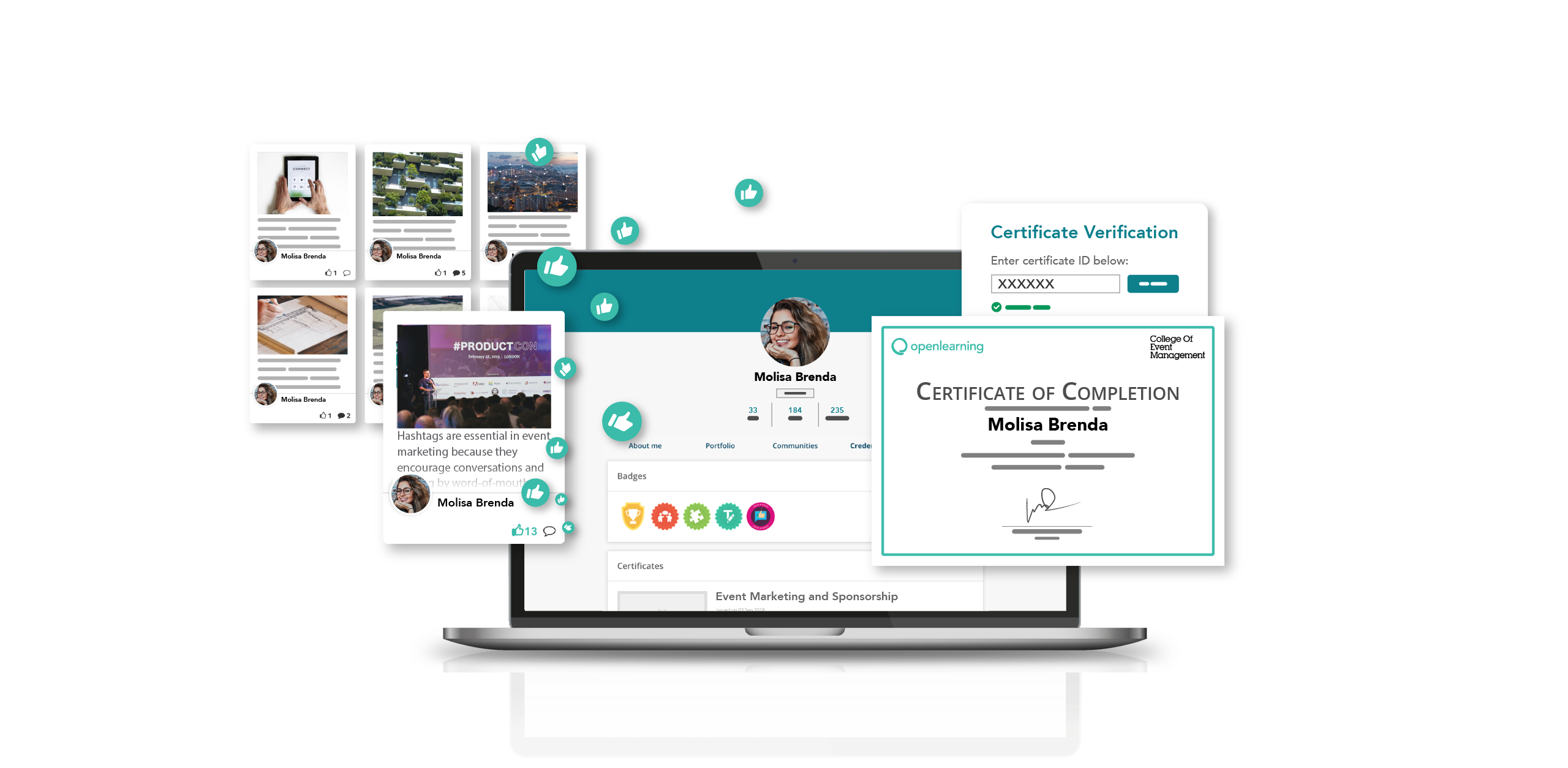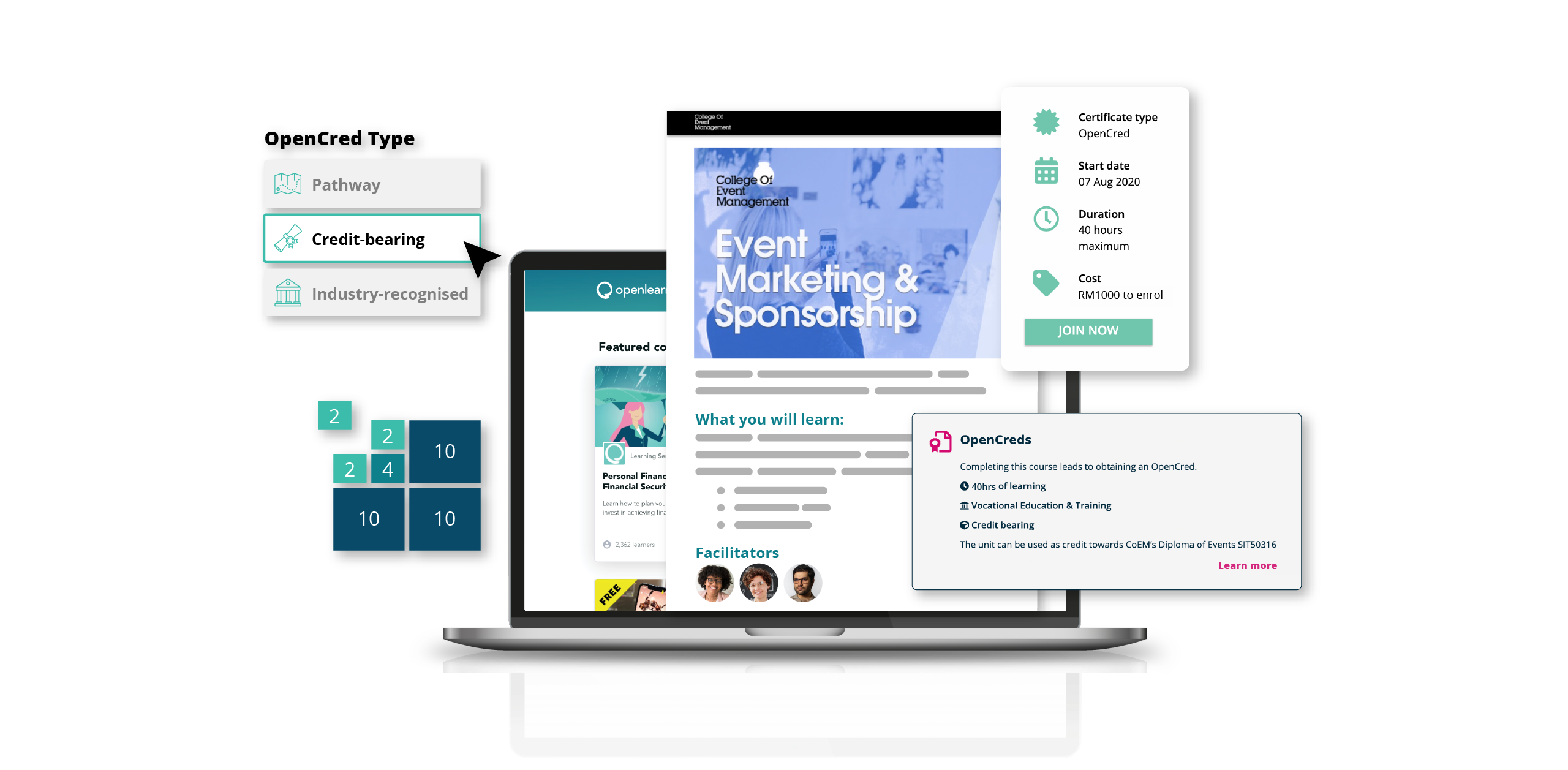Online learning platform OpenLearning is proud to release the OpenCreds for Malaysia micro-credentialing framework after an extensive industry consultation process—now available for Malaysian education and training providers to use via the OpenLearning platform.
The OpenCreds for Malaysia framework is adapted from the OpenCreds framework launched in Australia this July 2020. It has been localised to align with the Malaysian Qualifications Agency’s (MQA) Guidelines to Good Practices: Micro-credentials. This ensures that all micro-credentials built and delivered via the OpenLearning platform, or OpenCreds, adheres to existing Malaysian education policies and the Malaysian Qualifications Framework (MQF).
It is the first cross-sector micro-credential framework for Malaysia, and has the potential to be the new industry standard for the delivery of micro-credentials—enabling interoperability between higher education, technical and vocational education and training, and professional learning opportunities.
The release of the OpenCreds for Malaysia is in direct response to the rapid and fundamental changes to the economy that are disrupting labour markets, and the increased demand for new types of skills. Around the world, the nature of work is changing, as is the frequency with which we will need to upskill and reskill. The current pandemic too has played its part in accelerating the changes and disruption brought upon by Industry 4.0 and digital transformation to the jobs and employment market.
In order for Malaysians to remain employable and to improve their standard of living, they must learn new skills, increase their productivity and be more adaptable. It is this shift in mindset towards continuous lifelong and life-wide learning that will drive our talent and workforce to prepare for the future of work.


Malaysian learners can complete micro-credentials and earn credits towards qualifications or pathways. This gives learners more flexibility and access to affordable, industry-recognised, competency-based courses for upskilling and reskilling, as well as encouraging lifelong and life-wide learning.
The OpenCreds for Malaysia framework aims to enable education and training providers to adapt and capture this opportunity in the market by providing a common structure for the delivery of micro-credentials. This will make it possible for providers to offer flexible, more affordable courses that lead to credit in a formal qualification, are recognised by industry, and with a high-quality learning experience.
For learners, completing micro-credentials can lead to bigger qualifications or pathways depending on their individual goals—whether for a promotion or career change. OpenCreds that are delivered on OpenLearning are unique because they connect the learning experience to automatically generated digital portfolios that showcase a learner’s actual evidence of their skills and knowledge.

Micro-credentials that are delivered on OpenLearning, or OpenCreds, are unique because they connect the learning experience to automatically generated digital portfolios that showcases a learner’s actual evidence of skills and knowledge.
In recent years, interest in micro-credentials have risen as competency-based learning continues to gain momentum. More employers are now beginning to hire based on competencies, in addition to, or instead of, degrees. This presents a gap in the market for localised, industry-relevant, demand-driven, and stackable micro-credentials and pathways.

The OpenCreds for Malaysia framework makes it possible for education and training providers to capture this opportunity in the market for flexible, affordable, industry-recognised courses that lead to credit in a formal qualification or pathway.
OpenLearning Group CEO & Managing Director Adam Brimo said, “The release of OpenCreds for Malaysia is an exciting milestone for OpenLearning, the Malaysian education and training sectors, and lifelong learners. Now, Malaysian providers have the opportunity to not only offer OpenCreds that meet the needs of industry and learners, but enable them to diversify revenue, increase brand awareness, and future-proof their businesses.
OpenLearning is currently working with key partners in Australia to produce 26 OpenCreds, including education leaders like Open Universities Australia, Le Cordon Bleu Australia and DeakinCo.
In Malaysia, some early adopters are already leading the charge for micro-credentials, one of which is Universiti Sains Malaysia (USM).
The OpenCreds Framework seamlessly supports the creation and delivery of micro-credentials for both providers and learners. To date, we have already developed a series of over 40 micro-credentials on the OpenLearning platform, with plans to roll out many more in the following months.
Professor Abd Karim Alias, Director of USM'S Centre for Development of Academic Excellence
The Finance Accreditation Agency (FAA) is also committed to being the bridge between regulatory agencies, professional training providers and academic institutions to jointly design and develop micro-credentials on OpenLearning. “We are producing a set of quality assurance guidelines for the financial services sector to turn their continuous professional development and licensing programs into practical, competency-based micro-credentials,” said Dr. Eddy Chong Siong Choy, Chief Technical Officer at FAA.
Dr Lee Yew Kong, eLearning Coordinator at Universiti Malaya’s Faculty of Medicine sees potential for micro-credentials in the context of post-graduate medical education. “Medical professionals do not have the time to complete a 14-week semester-based course. What doctors need are short courses that fit in with their busy schedules, clinical rounds and postings. Micro-credentialing then presents opportunities for a seamless, interoperable system of accumulating credits that clinical masters students can complete at their own pace, on their way towards becoming specialists.”
Join us at the virtual OpenLearning Micro-credential Symposium 2020 this Wednesday, 25 November (Australia) and Thursday, 26 November (Malaysia) to enable cross-sector dialogues across the education and training ecosystem.
OpenLearning will host a virtual OpenLearning Micro-credential Symposium 2020 on Wednesday, 25 November in Australia and Thursday, 26 November in Malaysia as a platform for providers to come together for actionable discourse, practical workshops and partnership opportunities.
As part of the symposium, and to support the development of MQA-aligned OpenCreds, OpenLearning Malaysia will announce a RM600,000 investment towards building 30 market-leading micro-credentials via the OpenCreds for Malaysia Support Fund.
Malaysian higher education providers, vocational education and training organisations, industry associations, accreditation agencies and professional bodies who want to build their own micro-credential programs are welcomed to apply to the Fund. Successful applicants will each receive, per OpenCred, up to RM20,000 worth of learning design services, access to workshops and training, course building templates and collaborative marketing opportunities.
Sarveen Kandiah, Managing Director at OpenLearning Malaysia said, “The World Economic Forum’s Future of Jobs report estimates that 85 million global jobs could disappear by 2025. We see the launch of OpenCreds for Malaysia as just the beginning of our ongoing support for providers to increase access to lifelong learning and quality education. Through the framework and upcoming symposium, we aim to spark cross-sector dialogues between institutions to form partnerships, to innovate and to capture market opportunities with micro-credentials.”
Click here to download a copy of the OpenCreds for Malaysia framework.
Click here to watch a replay of the OpenLearning Micro-credential Symposium 2020 | Malaysia.
